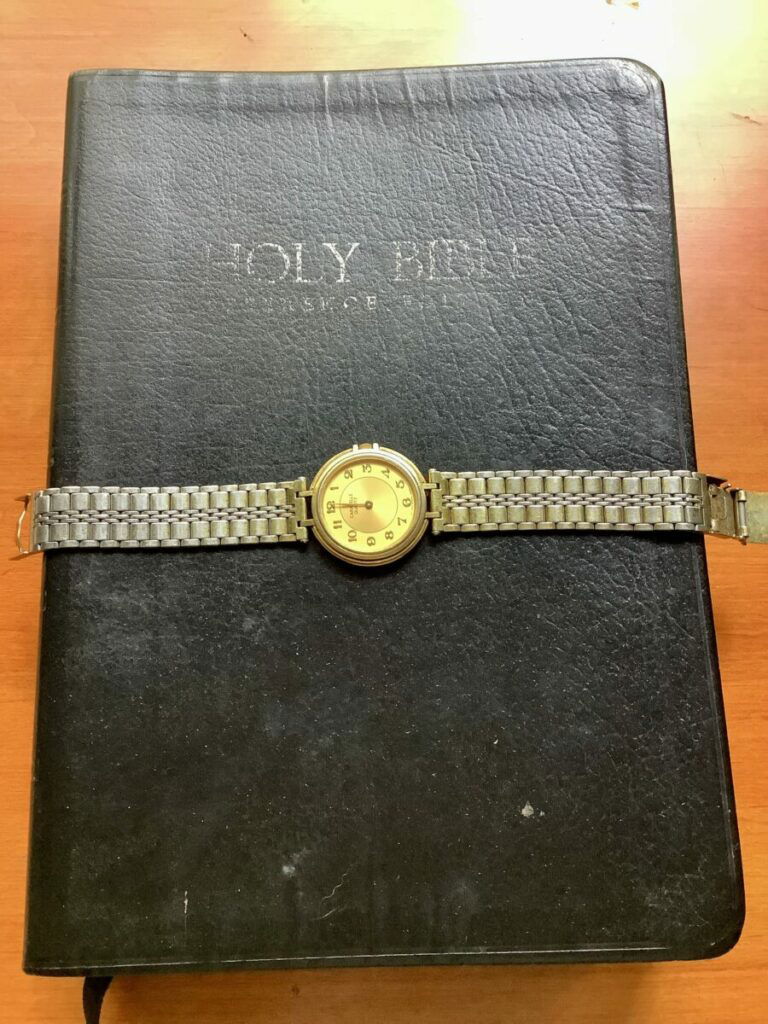My dad’s family bible and watch finally arrived in the mail to me nearly twenty years after his death. How it happened is a circuitous story, worthy of a southern novel. Of note, I did in the getting, offer to pay my nephew a sum of money to steal the bible off my sister’s coffee table. It didn’t come to that but hopefully gave my nephew and niece a tale to tell. Novelist Pat Conroy once contended there are no crimes in families beyond forgiveness. Well, that rings true.
The presence of these items in my house has got me thinking on the great southern writers who recorded colorful accounts of towns and families, and managed to do it with a balanced eye. I’ll reluctantly include Flannery O’Connor. She died at thirty-nine and never seemed (to me) to write from a place of enclosure. The perennial outsider was her vantage point, a hawk’s eye more predatory than intimate. But couldn’t she go to town on that! Who can forget the Misfit’s words in “A Good Man is Hard to Find”: She would’ve been a good woman if it had been somebody there to shoot her every day of her life. Chilling.
In the late seventies I saw Eudora Welty speak at UT, Knoxville. She exuded the rambling gentility present in her novel Delta Wedding. To read this book is to enter the soft, blurry rooms of a wide antebellum house. And Welty is right at the center, so keen at recording the nonverbal nuances rarely uttered between intimates. I learned from her that there is always a kind of grace at play along the periphery of our exchanges. This is echoed in James Agee’s novel A Death in the Family and its poetry/prose prologue Knoxville: Summer of 1915 where he writes of family and the time he lived “successfully disguised to myself as a child”. How beautifully he manages to capture time and architecture as it holds within it, a young boy. As an aside, Agee supposedly wrote this amazing preamble in ninety minutes.
There is a photo of me visiting Yaddo, the Saratoga Springs writer’s colony where McCullers, Capote, Katherine Anne Porter, and hoards of other southern refugees wrote. In the photo, I am holding a bottle of sherry in honor of McCullers’ everpresent flask. I remember the necessity of having the sherry bottle for the photo, a toast to the southern greats who wrote the range of human maladies with such celebratory spirit.
Family Bible
It’s all I want, all I call for
in this settling of affairs
the alcoholic attorney miles
away, my sister not answering.
Leather-bound, lasting.
White like an apron is white,
too greasy for heaven,
King James a stream of mud
you get stuck in.
And what will I do with it
but pick open gold-leafed pages
like a scab? Beware
the clear drainage from a cut,
beware tears that come too clean.
I am trying to hold
something up to praise here,
a halo of family propped
around a coffee table
where the book sat,
a thumbprint somebody surely left
on its cover, dog-eared
(though we were told not to)
at the verses before the fall.


Share this post with your friends.


A poet with an astute and discriminating eye. I particularly admire the lines, “King James a stream of mud/ you get stuck in,” and “but pick open gold leaf pages/ like a scab.” The economy of language that speaks with the power of when we know something is exactly right.